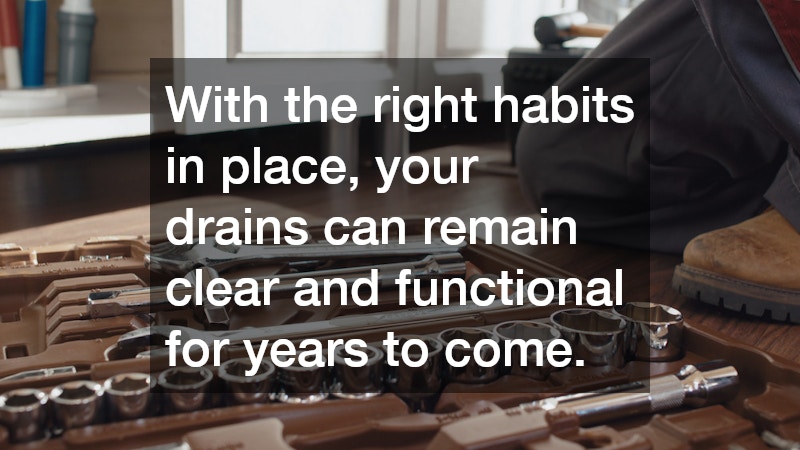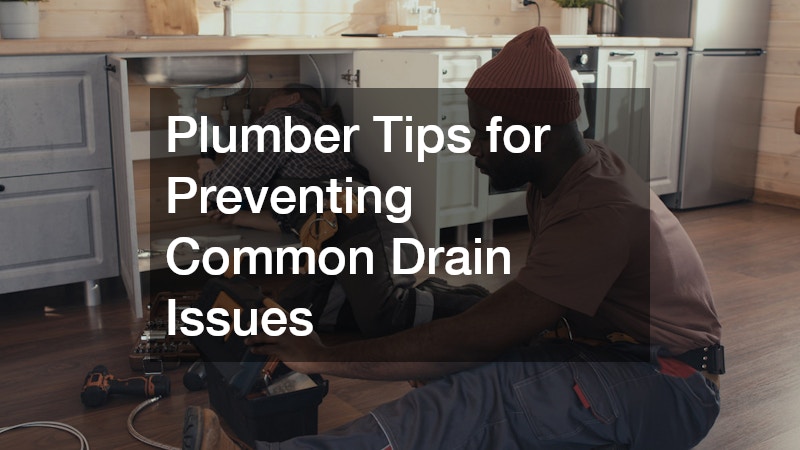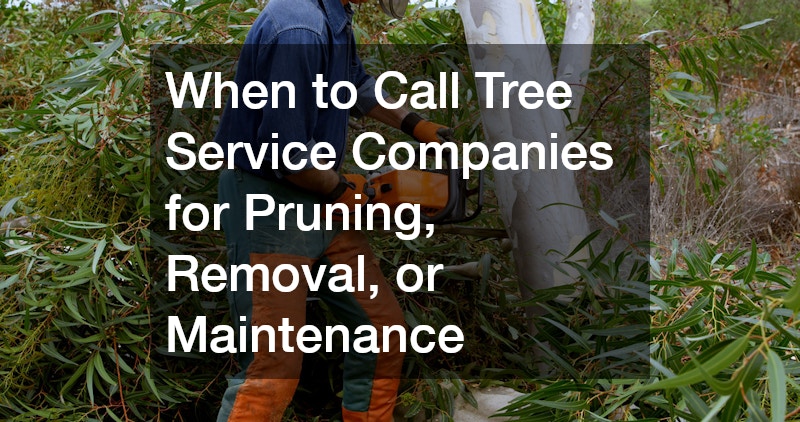Blocked drains are a common household nuisance that can lead to costly repairs if left unaddressed. From unpleasant odours to water backing up into sinks, showers or toilets, drainage issues disrupt daily routines and affect your overall plumbing system’s efficiency. Fortunately, most drain blockages can be avoided with routine care, awareness of what goes down your drains and some preventative strategies. This guide outlines simple yet effective tips to help homeowners prevent common drain issues before they become serious problems.
Understand What Should & Shouldn’t Go Down the Drain
One of the most effective ways to prevent drainage issues is to control what enters your pipes in the first place. In the kitchen, grease, fat and oil are major offenders.
While these substances may seem harmless when hot and liquid, they quickly solidify in your pipes, trapping food particles and creating blockages. Instead of pouring them down the sink, allow fats and oils to cool in a container, then dispose of them in the rubbish.
In the bathroom, hair, soap scum and hygiene products are leading culprits. Even small strands of hair can accumulate over time and form clumps that block water flow. Install drain guards or strainers in showers and sinks to catch debris before it enters the pipes. These inexpensive tools can drastically reduce the chance of a clog forming.
Maintain Your Drains With Regular Cleaning
Drains benefit from consistent upkeep, just like any other part of the home. Regular cleaning helps prevent buildup and keeps water flowing freely. For most households, flushing the drains with hot water once a week can help break down grease and clear away early signs of blockage. Avoid using boiling water on porcelain sinks or plastic piping, as extreme temperatures may cause damage. Instead, run the hot tap for several minutes to allow heat to loosen potential build-up.
Bicarbonate of soda followed by white vinegar is another safe cleaning solution. This combination creates a fizzy reaction that can dislodge grime and minor obstructions. After pouring both into the drain, allow the mixture to sit for 10 to 15 minutes before flushing with hot water. This natural remedy is gentle on pipes and avoids the harshness of chemical cleaners, which may corrode plumbing over time.
Use Drain Covers & Strainers in High-Risk Areas
Prevention is often more effective than cleaning after the fact. Drain covers and sink strainers offer a physical barrier that stops problem materials from entering your plumbing system. Use them in all kitchen and bathroom sinks, as well as laundry tubs, to catch items such as food scraps, lint and small objects. Clean these strainers regularly to maintain their effectiveness and prevent them from becoming sources of unpleasant smells themselves.
In shower and bath areas, hair catchers are especially useful. Choose a product designed to fit snugly over your drain so that water passes through easily while hair and debris are trapped. Some designs are removable and reusable, while others are disposable. Both options reduce the risk of major clogs forming over time.
Educate Household Members & Guests
Drain misuse often occurs not through negligence but through a lack of awareness. Children and even adults may not realise what can and cannot go down the sink or toilet. Take the time to educate everyone in the home about proper drain care. For example, flush only toilet paper and human waste in the toilet. Wet wipes, cotton buds and sanitary products should always be placed in the bin, even when labelled as “flushable”.
In shared living arrangements or when hosting guests, it may be helpful to post a simple sign in the bathroom reminding users what not to flush. Encouraging consistent habits will go a long way toward preserving your plumbing system’s health.
Schedule Professional Inspections & Maintenance
Even with the best preventative care, drains may still require professional attention from time to time. A qualified plumber can carry out inspections to identify signs of trouble early, such as slow draining, recurring blockages or unusual odours. They may also use tools like drain cameras to locate hidden issues deep within your pipes.
Routine maintenance services can include deep cleaning, pipe relining or identifying root intrusions that may be affecting water flow. In some homes, older plumbing systems are more vulnerable to damage or sediment buildup, making professional support essential for long-term functionality. A licensed plumber brings the tools and knowledge needed to resolve and prevent drainage issues efficiently.
Don’t Rely on Chemical Drain Cleaners
While chemical drain cleaners are often marketed as quick fixes, they can do more harm than good. These substances may break down minor blockages, but they are also highly corrosive and can damage older pipes or fittings. Additionally, they often fail to reach deeper obstructions, leaving a recurring problem unresolved.
Instead, opt for natural cleaning methods or consult a professional when a blockage persists. This approach protects your plumbing infrastructure and reduces the risk of environmental harm caused by harsh chemicals entering waterways.
When in doubt or if persistent issues arise, it’s wise to consult a licensed plumber who can address the root cause and offer tailored advice. Investing in preventative measures today not only protects your home’s plumbing but also saves money, stress and water over time. With the right habits in place, your drains can remain clear and functional for years to come.



